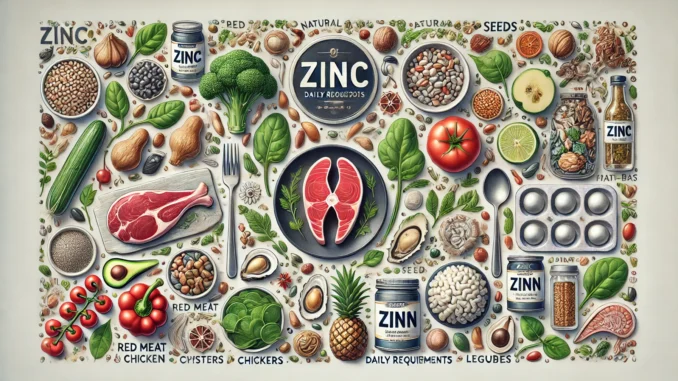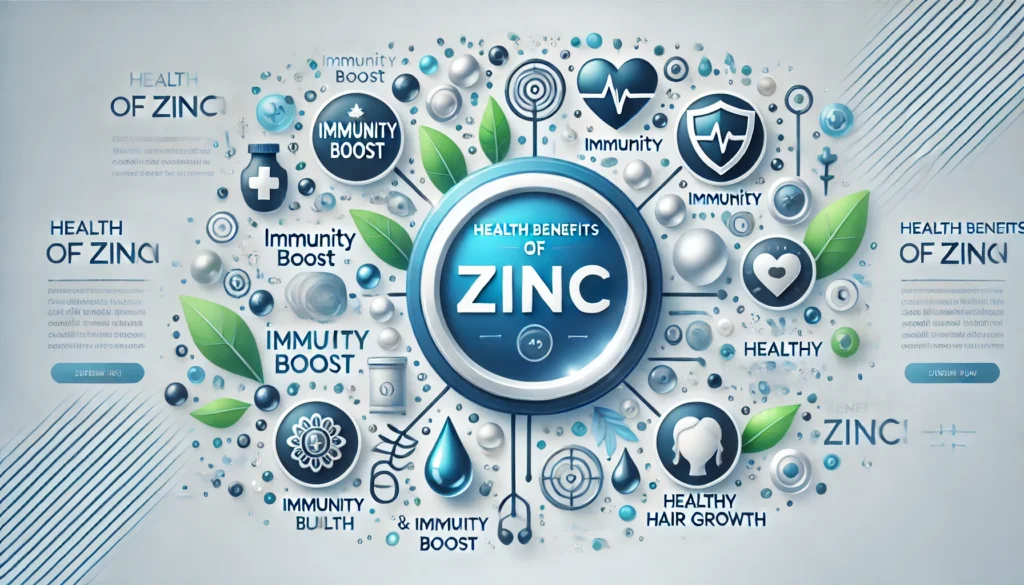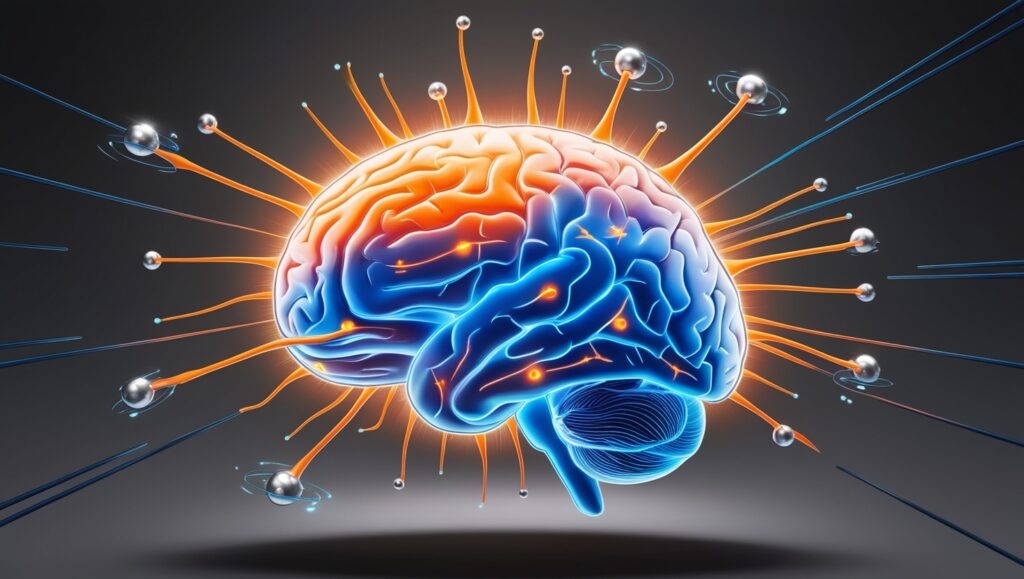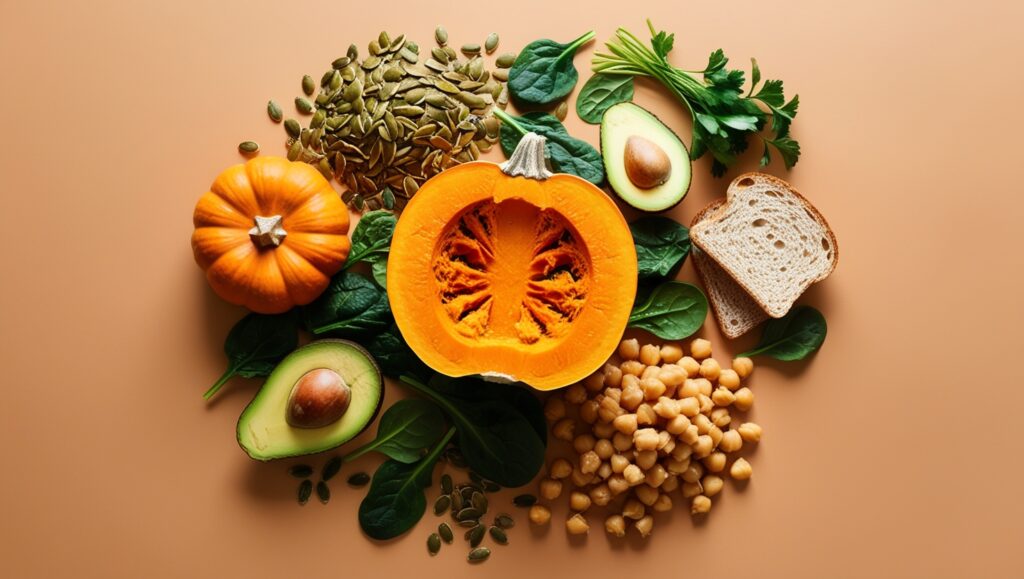
The Ultimate Guide to Zinc: Benefits, Natural Sources, and Daily Requirements
Introduction
Zinc is a crucial trace mineral that plays a significant role in overall health and well-being. It’s a small but mighty nutrient essential for numerous bodily functions, from boosting the immune system to aiding wound healing. Yet, many people don’t realize the importance of getting enough zinc in their diet.
What is Zinc?
Zinc is a vital mineral involved in over 300 enzymatic reactions in the body. It acts as a catalyst for various processes, including cell division, DNA synthesis, and immune system performance. In simpler terms, without adequate zinc, our body can’t function at its best.
Importance of Zinc in the Human Body
The body doesn’t store zinc, which means regular consumption through food or supplements is necessary. Zinc supports the immune system, helps heal wounds, and plays a role in protein synthesis and cell production. Whether you’re recovering from a cold or trying to keep your skin clear, zinc is indispensable.
Why You Should Care About Your Zinc Intake
A lack of sufficient zinc can lead to various health problems, from increased susceptibility to infections to poor cognitive function. Ensuring you get enough zinc is a simple yet effective way to maintain your overall health.
The Health Benefits of Zinc
Boosts Immune Function
Zinc is a powerhouse for the immune system. It helps white blood cells function properly, aiding the body in fighting off infections and viruses. A good intake of zinc can reduce the duration of the common cold and improve overall immunity.

Promotes Wound Healing
If you’ve ever noticed how some skin creams contain zinc, it’s for a good reason. Zinc is critical for collagen synthesis, making it essential for wound healing and skin repair. This mineral helps new cells form, speeding up the healing process.
Supports Healthy Skin
Acne and skin conditions can often be linked to a zinc deficiency. Zinc’s anti-inflammatory properties can help alleviate symptoms of acne, eczema, and other skin ailments, keeping your skin healthy and glowing.

Enhances Brain Function
Zinc has a crucial role in brain health, impacting cognitive functions and learning abilities. It helps regulate communication between neurons and affects memory. Low levels of zinc have been associated with mood disorders and cognitive decline. Learn more…

Aids in Digestion
Zinc assists in the production of digestive enzymes, helping the body break down food and absorb nutrients. Proper zinc levels ensure a smoothly functioning digestive system, reducing issues like bloating or indigestion.
Improves Eye Health
Zinc is a key player in maintaining good vision. It helps transport vitamin A from the liver to the retina to produce melanin, a protective pigment in the eyes. Adequate zinc levels can help prevent age-related macular degeneration.
Supports Reproductive Health
Zinc is known to aid reproductive health, particularly in men. It plays a role in sperm production and hormone regulation, impacting fertility. For women, zinc contributes to hormone balance, making it important for overall reproductive wellness.
Natural Sources of Zinc
Animal-Based Sources
Red Meat
Beef, lamb, and pork are excellent sources of zinc. A small portion of lean meat can provide a significant part of your daily requirement.
Poultry
Chicken and turkey are not only rich in protein but also in zinc, making them a great option for a healthy diet.
Seafood (Oysters, Crab, and Lobster)
Oysters are particularly high in zinc, with a single serving offering more than the daily requirement. Other seafood like crab and lobster are also great sources.
Plant-Based Sources

Nuts and Seeds
Pumpkin seeds, sunflower seeds, and cashews are excellent plant-based sources of zinc. These can be a perfect snack to boost your zinc intake.
Legumes (Beans, Lentils, Chickpeas)
Legumes are affordable and versatile zinc sources. Adding beans, lentils, or chickpeas to your meals can provide a good zinc boost.
Whole Grains
Quinoa, oats, and brown rice contain moderate amounts of zinc. Whole grains are a healthy choice for a balanced diet.
Vegetables (Spinach, Kale, Broccoli)
Leafy greens like spinach and kale, as well as cruciferous vegetables like broccoli, are plant-based options for increasing zinc intake.
Daily Zinc Requirements for Different Age Groups
Infants and Children
- Infants (0–6 months): 2 mg/day
- Children (1–8 years): 3–5 mg/day
Adolescents
- Boys (9–13 years): 8 mg/day
- Girls (9–13 years): 8 mg/day
Adults
- Men: 11 mg/day
- Women: 8 mg/day
Pregnant and Lactating Women
- Pregnant: 11 mg/day
- Lactating: 12 mg/day
Older Adults
- Men: 11 mg/day
- Women: 8 mg/day
Signs and Symptoms of Zinc Deficiency

Fatigue and Weakness
Lack of energy and constant fatigue can be linked to low zinc levels. This mineral is crucial for maintaining energy levels.
Frequent Infections
A weak immune system is often a result of zinc deficiency. If you’re getting sick frequently, it might be a sign you need more zinc.
Poor Appetite
A reduced appetite can sometimes indicate a lack of zinc. This mineral is important for taste perception and appetite regulation.
Skin Issues (Rashes, Acne)
Acne, rashes, or other skin irritations can be symptoms of insufficient zinc. Proper zinc levels contribute to healthier skin.
Hair Loss
Zinc plays a role in hair tissue growth and repair. Hair loss can be a sign that your body isn’t getting enough zinc.
How to Ensure You’re Getting Enough Zinc
Balanced Diet Tips
Include a variety of zinc-rich foods in your diet to ensure you’re getting enough. A balance of animal and plant-based sources can help meet daily requirements.
Considering Zinc Supplements
If you’re not getting enough zinc from food, supplements can be an option. Consult a healthcare professional before starting any supplementation.
Pairing Zinc-Rich Foods with Vitamin C for Better Absorption
Combining foods high in zinc with vitamin C-rich foods can improve absorption, boosting the effectiveness of your zinc intake.
Potential Risks of Excess Zinc
Zinc Toxicity
While zinc is essential, too much can lead to toxicity, causing nausea, vomiting, and other digestive issues. It’s crucial to stay within the recommended daily limits.
Symptoms of Overconsumption
Symptoms of excess zinc intake include stomach cramps, headaches, and a metallic taste in the mouth. Always monitor your intake.
Safe Upper Limits
The safe upper limit for zinc is 40 mg per day for adults. Exceeding this amount regularly can lead to health issues.
Zinc Supplements: Pros and Cons
Types of Zinc Supplements
Zinc supplements come in various forms like zinc gluconate, zinc citrate, and zinc sulfate. Each has its pros and cons regarding absorption and taste.
Choosing the Right Supplement
Consider factors like absorption, dosage, and personal needs when choosing a zinc supplement. Always follow recommended dosages.
When to Consider Supplementation
If you have dietary restrictions or a medical condition affecting you, zinc absorption supplementation might be necessary. Consult your doctor for advice.
How Cooking and Food Preparation Affect Zinc Levels
Effect of Heat on Zinc Content
Best Cooking Methods to Preserve Zinc
Shorter cooking times and methods like steaming or sautéing can help maintain food’s zinc levels.
How to Improve Zinc Absorption Naturally
Foods That Boost Zinc Absorption
Animal-based proteins can enhance zinc absorption, and pairing foods like meat or dairy with plant-based zinc sources can improve uptake.
Foods That Inhibit Zinc Absorption
Phytates, found in whole grains and legumes, can hinder zinc absorption. Soaking or fermenting these foods can reduce phytate content.
Tips for Better Absorption
Consuming a varied diet and combining zinc-rich foods with enhancers like citrus fruits can improve overall zinc absorption.
Frequently Asked Questions
What are the best food sources of zinc?
Animal-based foods like red meat, poultry, and seafood are excellent sources of zinc. Plant-based options include nuts, seeds, legumes, and leafy greens.
How much zinc do I need daily?
Daily zinc requirements vary by age and gender. Adult men need 11 mg/day, while adult women require 8 mg/day.
Can I take zinc supplements every day?
Yes, but it’s best to consult a healthcare professional to determine the right dosage and ensure you don’t exceed safe limits.
What happens if I consume too much zinc?
Excess zinc can lead to toxicity, causing symptoms like nausea, headaches, and stomach cramps.
Is zinc beneficial for skin health?
Yes, zinc has anti-inflammatory properties and supports wound healing, making it beneficial for acne and other skin conditions

Leave a Reply